At Nick Hornby’s first game as a member of the crowd at an Arsenal game, he was taken aback by the anger of the men in the crowd and their hatred towards their own players. He quotes a member of the crowd: ‘You’re a DISGRACE, Gould. He’s a DISGRACE!’ ‘A hundred quid a week? A HUNDRED QUID A WEEK! They should give that to me for watching you.’ (How quaint this figure of ‘hundred quid’. These days the brilliant, elegant, graceful Yaya Toure can complain about not getting a birthday cake, despite his 200,000 pound weekly pay.) Such is the imbalance between the loyal service of the fans in the face of what seems to be the betrayal of the players, coach, CEO. All summer long they build our hopes up: they strut, develop their hairstyles, ink-up their arms. And then all of a sudden, the ball is bounced in March and out come the attitudes of ‘hmmphf, nah, don’t feel like it.’
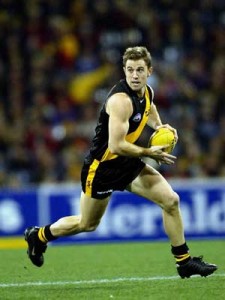
At my first Richmond fan as a Richmond fan, sometime in 2002, I was taken aback by the anger directed towards Joel Bowden. I was sitting high up in the Southern Stand and a few angry men were shouting abuse at him as he kicked the ball up and down the wing, doing what a footballer does. Perhaps he made some mistakes, but, perhaps those angry men exaggerated his badness. I don’t think Mr.Bowden could hear them; I don’t those sitting in the front row of the top deck could hear them. On they shouted. Perhaps Mr.Bowden’s biggest crime was to have been considered at first, to be a better player than he came to be. But, Mr.Bowden proved ever resilient. And over the years, he did prove to be better than the player so often abused by some members of the Richmond faithful. He was focused and determined in defence. That was his niche. When he was interviewed, he always seemed a little non-plussed by the fuss football seems to create. By the time Mr.Bowden had proven himself to be a reliable and consistent defender, those angry men had no doubt found someone else to abuse in the team. Probably Richard Tambling: whose greatest crime was to have been selected ahead of Lance Franklin. Yes, something he didn’t do; but something that was done to him.
***
The ball is bounced and an ineffective punch is made by the ruckmen. It falls loosely and one of the ruckmen handballs it to a running, smaller man. His head is bowed over the football. His back is arched. He takes the ball in his stride and makes a couple of paces before kicking it towards his teams goals. The mark is taken, not by the man he intended it for, but, by some interloper, desperate to spoil the party. The ball is cleared outwards, to the left flank. Then kicked into the centre. Then out to the wide and empty expanse of the southern, right flank. A man, tall, loping, marks the ball casually, for there is no one on his hammer – so to speak – he runs, like he has done so many times before: quickly but not hurriedly. And, as he sees the line in the grass stating 50meters, he kicks generally towards the middle of those two white posts. It floats in between them. The commentator’s voice soars. The crowd rises.
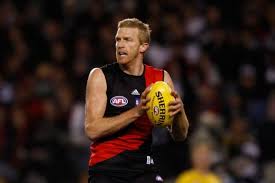
There are many in attendance. They’ve been given some reconciliatory entertainment. But, they want footy. They have it immediately. It’s too easy though: there is no struggle. And that is the pattern for the rest of the game. The winning team merely has to follow some of the very basic guidelines of ‘how to play footy’. The other team doesn’t show up; they don’t come to play. They don’t play. They retire: happy to be there in their uniforms; they’re spectators on the ground. They did their best work over summer: talking themselves up. Talking about the great season they would have. Talking about how they would repay the fans for their loyalty. About how they would do it for the jumper. 100 years of the sash, the club celebrates. It may as well be 10,000 years of suffering. Matt White used to kiss the jumper after scoring his long and running goals. Damien Hardwick said, ‘he wanted too much money and for too long’. Let’s just call that a misjudgement. Port have a spot for him and he’s part of their winning culture, their immediately winning club. Good on them. Good on Matty White for knowing what was good for him.
An errant kick into the forward line and it is marked by a defender. He kicks it cautiously further out into the pocket who makes another cautious and slow kick somewhat toward the centre of the field albeit still in their back half. The player marks and plays on; another kick and then some run. A handball to a faster runner, who after a couple of long and powerful strides kicks the ball into the team’s forward line. Two players come to meet the ball. The player, who is a meter or two off his marker, let’s the ball bounce, and it comes up directly to him, he turns: neatly, quickly and with balance. The defender, who could have so easily been in the better position, were the bounce a little more dramatic, is now forced into chasing that smaller crouching man. He is poised and focused and runs straight towards the goals; taking a bounce of the ball as a means to steady himself and to make sure he doesn’t run too far. He kicks the ball through the goals lowly, turns, again and runs to his teammates to celebrate and re-focus them. To keep them tuned into this moment. There is no exuberant fist pumping: just a couple of high fives with the players who were involved in this passage of play.
The score is 30 to 14 and there is 10minutes left in the second quarter. And so, the player, having scored his goal turns and runs towards the bench. He’s taking himself off. It seems a part of a plan. He is the team’s best player, the team’s captain and now seems the time to take a rest. It’s a part of this thing called rotation, apparently. Spinning around. Maintaining maximum output. Players playing in bursts. I’m not sure about it. And then, having arrived 3/4s towards the boundary, he sees no-one is ready to come on. He quickly mouths his disappointment and confusion, turns, once more and surveys the scene before him and what he must do. Perhaps it was at this moment that the Tiges lost their composure. Probably not though. It was an odd look. ‘I want to come off, but no, I have to stay on.’ The captain suffered a knock-back; between coach and captain there must have been some kind of miscommunication. Between the administrators and the players. If you’re in good form, why come off, me thinks? I know nothing – I’m watching from a long way away, but I didn’t like it.
***
Hornby’s memoirs of his life as an Arsenal fan were published in 1992: the year before Dustin Fletcher’s debut for Essendon – the player who so easily showed up the Tiges’ defenders in the first minute of the game. He was given none of the respect he deserves and so he pulled the pants down on the Richmond team. When Hornby writes of the anger and bewildering loyalty of the Arsenal fans, he may as well be writing of the Tiges’ fans. Our team, at the moment, is great in memory and in myth only. As Gerard Whateley plainly called it on Sunday morning: this season has become wretched. But Hornby wrote in the pre-Wenger era and better days were ahead: their own fans would soon be chanting ‘boring boring Arsenal’ in an ironic manner – proud of the style of their team, proud of their manner of winning. Hardwick may still become Richmond’s Wenger. Hopefully, just hopefully, one day we can chant from one end of the Southern Stand to the next, ‘wretched, wretched Richmond’ as the team piles on one goal after the next, sometime late on a Saturday afternoon, deep, deep into September.

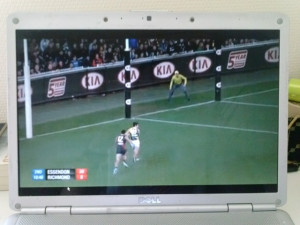
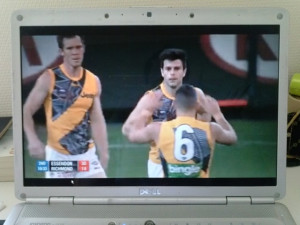
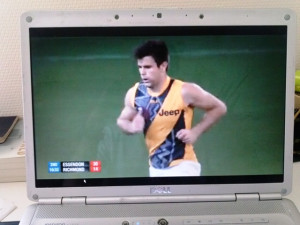
I think it WAS an important moment in losing this winnable game. I think Cotch was particularly frustrated as he had only a few minutes before been called to the bench, run hard then been turned back. (Haven’t watched replay but that’s how I remember it). Lost momentum, lost focus, bang bang bang before half time and that’s all it takes to put away a team of impaired spirit.